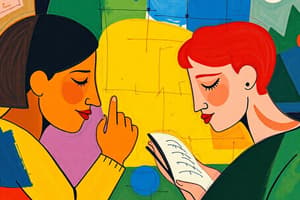Podcast
Questions and Answers
According to constructivist psychology, what is the role of the human mind?
According to constructivist psychology, what is the role of the human mind?
- To actively give meaning and order to reality (correct)
- To passively receive information
- To investigate how humans create systems for understanding their worlds
- To criticize previous approaches
What is Jean Piaget's theory in constructivist psychology?
What is Jean Piaget's theory in constructivist psychology?
- How adults develop and learn
- How individuals passively receive information
- How children develop and learn through their surroundings (correct)
- How individuals develop increasingly simple schemas
What is personal construct theory by George Kelly primarily concerned with?
What is personal construct theory by George Kelly primarily concerned with?
- The active construction of reality by the environment
- The passive reception of information
- The role of the teacher in facilitating learning
- The role of the observer in interpreting reality (correct)
What is post-rationalist cognitive therapy by Vittorio Guidano hypothesized to create?
What is post-rationalist cognitive therapy by Vittorio Guidano hypothesized to create?
What is the main emphasis of constructivism in education?
What is the main emphasis of constructivism in education?
What is the teacher's role in constructivist education?
What is the teacher's role in constructivist education?
What does constructivist psychology investigate?
What does constructivist psychology investigate?
What could constructivism translate into in psychotherapy?
What could constructivism translate into in psychotherapy?
What does constructivism in education emphasize?
What does constructivism in education emphasize?
Study Notes
Psychological School of Thought Summary
- Constructivism in psychology refers to diverse schools of thought with a shared critique of previous approaches and assumptions about the active constructive nature of human knowledge.
- Constructivism is an epistemological premise grounded on the assertion that the human mind actively gives meaning and order to reality.
- Constructivist psychology investigates how human beings create systems for meaningfully understanding their worlds and experiences.
- In psychotherapy, constructivism could translate into a therapist asking questions that confront a client's worldview to expand their meaning-making habits.
- Jean Piaget's theory in constructivist psychology describes how children develop and learn in an ongoing process and interchange between individuals and their surroundings, through which individuals develop increasingly complex schemas.
- Personal construct theory, by George Kelly, is concerned primarily with the epistemic role of the observer in interpreting reality.
- Post-rationalist cognitive therapy, by Vittorio Guidano, hypothesized that the mind creates a complex system of abstract rules responsible for the concrete and particular qualities of our conscious experience.
- Constructivist psychology in education emphasizes that students are always engaged in a process of actively constructing meaning.
- The teacher can only facilitate or thwart the process of constructing meaning, but not invent it.
- Constructivism in education makes students, teachers, the environment and anyone or anything else in which the student has interaction active participants in their learning.
- Constructivism in education is an approach that emphasizes the importance of the learner's active involvement in the learning process, rather than the passive reception of information.
- Constructivist psychology in education argues that the teacher should be a facilitator, not an instructor.
Studying That Suits You
Use AI to generate personalized quizzes and flashcards to suit your learning preferences.
Description
Test your knowledge about the Psychological School of Thought with this quiz! Explore the concepts of constructivism and its various schools of thought, including Jean Piaget's theory and George Kelly's personal construct theory. Discover how constructivism is applied in psychotherapy and education, and learn the importance of the learner's active involvement in the learning process. Take this quiz to enhance your understanding of constructivist psychology and its impact on human knowledge and learning.




